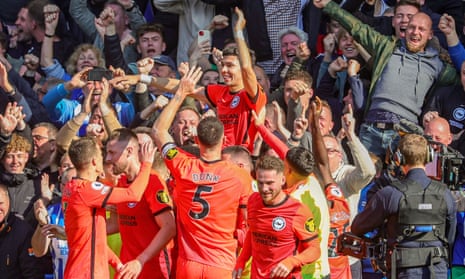It all began with fruit machines on the Brighton seafront: cherries and bells, the flickering lights and weathered carpets of the West Street arcades, the little tinkle of change as a nine-year-old boy’s pocket money disappears down the chute, never to be seen again. Later it would be the horses and dogs, football and cricket, stocks and shares, poker and property empires. And later still the happiness and livelihoods of real human beings, the pride of an entire town.
From his very earliest years Tony Bloom knew he had an addictive personality that drove him to gamble. And as the stakes began to rise, he realised he would need to learn how to do it better than anyone else.
The owner of Brighton & Hove Albion is such a secretive character these days that the few known stories about him have assumed a kind of sacred, apocryphal quality. One is that on the eve of the 1998 World Cup final, Bloom, then working as a trader for the bookmaker Victor Chandler, urged his bosses to stake their entire profits from the tournament on France to beat Brazil, calculating – correctly, as it turned out – that the probability of a home win had been grossly underpriced. Then as now, Bloom knew that the only true path to glory lay in being prepared to risk everything.
We know, too, how Brighton will approach Sunday’s FA Cup semi-final against Manchester United: with risk, which is not the same thing as recklessness. They are prepared for their defenders to risk leaving space behind if it allows them to affect play higher up the pitch. They are prepared to risk losing the ball in the most dangerous areas if it forces opponents to overcommit against them.
Above all they are prepared to trust in a group of players who a year ago could have walked down Brighton beach without being recognised: players such as Kaoru Mitoma and Evan Ferguson and Julio Enciso, players whose true potential was hiding in plain sight.
Then again, they have always been prepared to do things a little differently in Brighton: a city of “anarchists, gays, left-wingers, muesli-eaters, ne’er-do-wells and nightclubbers”, as one of their most famous fans Norman Cook liked to put it.

Bloom himself may be some, more or none of these things, but what marks him out as a genuine son of the town is that constant and restless search for difference: for new edges and new approaches, new information and new ideas. It is the story of Brighton and it is the story of Albion, too: a club that have come from the very brink of the abyss to the very verge of the promised land.
Certainly there was little prospect of an immediate return when Bloom began bankrolling Brighton in secret around the turn of the century. The club had been 30 minutes away from losing their Football League status in 1997, and with their Goldstone Ground home sold off were residing in the six-stand mayhem of Withdean athletics stadium, the only ground in the country where a wayward striker could score a goal into the hammer cage. It was Bloom’s £93m investment that secured the crucial move to Falmer and the Amex Stadium that has furnished so many of Brighton’s recent memories.
As a poker player, Bloom had no qualms in staking $500,000 of his own money in a heads-up match against Daniel Negreanu, one of the all-time greats of the game. (He lost.) As a punter, he calmly staked £600,000 on one of his own horses to win the Queen Mother Champion Chase at Cheltenham. (He won.) But take on a lower-league football club and you are taking on a different kind of gamble entirely.

Here you are gambling with other people’s time and jobs, their patience and their hope. The rules of the game are never quite clear and somebody somewhere is always trying to skew the odds. And so, perhaps, the real legacy of Brighton’s rise is to illustrate what can be achieved with trust, courage, brains and a process: a tale of underdog triumph in the most rigged casino game of them all.
From this distance, knowing what we do now, it is tempting to identify a certain inevitability in Brighton’s rise, to draw a straight narrative line from Bloom’s investment to the new stadium to the recruitment magic of recent seasons to the success of the present day.
after newsletter promotion
Certainly Brighton’s command of data and intelligence is the envy of many larger clubs: a well-oiled machine that can spit out a Roberto De Zerbi or a Pervis Estupiñán on demand, whose analysis of players stretches to measuring the volume of noise a crowd makes when they move forward with the ball.
But as any career gambler will tell you, there are always as many losses as wins. There were relegations in 2003 and 2006, three heartbreaking playoff failures in four seasons between 2013 and 2016. Even now, as they menacingly circle the top six and threaten a first major trophy, there remain cherishably few guarantees.
Their best players and brains will continue to be picked off. Their style and practices will be ruthlessly imitated by richer clubs. Meanwhile, the examples of Southampton and Swansea offer a warning of the precarious foundations on which all so-called “model clubs” are built. One bad transfer window, one wrong managerial appointment, one poaching too many and all of a sudden there is very little upside to being the cleverest salmon in a world of giant sharks.
Bloom’s big gamble – and really, he has never tried to disguise it as anything else – is that Brighton can keep evolving where others stagnated, not by trying to preserve what they have but by continuing to eat up the ground in front of them. By raising the stakes when others would lower them. Yesterday, Graham Potter and a comfortable mid-table existence. Today, the FA Cup semi-final and the thrill of the unknown. Tomorrow, Europe, the Champions League, the world.
How long can one man and one club keep beating the house? Discovering the answer to that question is going to be one of English football’s most fascinating subplots.
